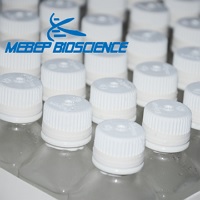
BsaI
2022-09-15
Benzo Nuclease
2022-10-26Description
Duplex specific nuclease (DSN) is a specific nuclease enzyme, which has strong activity to hydrolyze DNA in dsDNA or DNA-RNA hybrid duplexes. The DSN has very slight activity for hydrolysis ssDNA or RNA.
Source
Recombinant E. coli
Concentration
0.1U/μL, 1U/μL (customized)
Application
Homogenization of Full-length cDNA Library
Single nucleotide polymorphism (SNP) detection
high-throughput sequencing
Detection of microRNAs (miRNAs)
Quality
purity>95% by SDS PAGE
Storage
Store at -20°C
Unit Definition
Under the standard reaction system, the increase of 0.001 per minute in the absorbance of 50 𝜇g/ml calf thymus DNA at 25 ℃ is defined as 1 unit.
Package
| Component | DSN0101 | DSN0102 | DSN0103 |
| Duplex specific nuclease | 50U | 100U | 1000U |
| 10×DSN Reaction Buffer | 0.5ml | 0.5ml | 3ml |
| 2×DSN Stop Buffer | 1ml | 1ml | 6ml |
Protocol
1. Prepare the reaction according following table on ice.
| Components | Quantity |
| 50-500 ng DNA | x μl |
| 10×DSN Reaction Buffer | 1 μ |
| DSN | y μl |
| ddH2O up to | 10 μl |
2. Mix gently and centrifugate briefly.
3. Incubate at 65 ℃ for 7-20 min.
4. Add 5 μl 2 × DSN Stop Buffer, gently mixed, centrifuged briefly, 65 ℃, incubated for 5 min to terminate the reaction.
Note
1. DSN digestion time depends on the sample and specific experimental requirements. The incubation temperature can vary from 35 to 70 ℃; In this case, the incubation time and DSN concentration need to be optimized separately.
2. DSN is active in the presence of divalent cations (Mn2+, Co2+ or Mg2+). The concentration of Mg2+ions in most applications should be at least 5 mM. EDTA can inhibit DSN activity.
3. The optimum temperature for DSN activity is 60 ℃. However, DSN retains only 10% activity at 80 ℃.
4. DSN is resistant to protease K treatment (incubation at 37 ℃ for 30 minutes).
5. DSN is highly sensitive to salt ion concentration (for example, the activity decreases by 10 times under 0.2M NaCl.
Order
| DSN01 | Duplex specific nuclease | 0.1U/μl Specific nuclease enzyme hydrolyze DNA in dsDNA or DNA-RNA |




